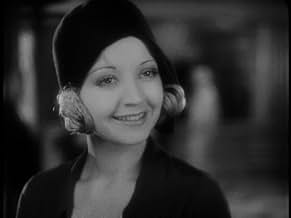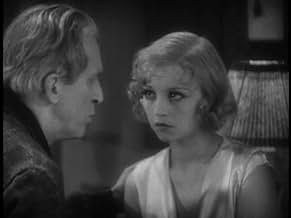Füge eine Handlung in deiner Sprache hinzuSheba has a dull boyfriend and seems destined for a dull marriage when she meets a rich playboy who has money to burn and places to go. She gets involved with the playboy and never seems to ... Alles lesenSheba has a dull boyfriend and seems destined for a dull marriage when she meets a rich playboy who has money to burn and places to go. She gets involved with the playboy and never seems to notice that he might be shady and untrustworthy.Sheba has a dull boyfriend and seems destined for a dull marriage when she meets a rich playboy who has money to burn and places to go. She gets involved with the playboy and never seems to notice that he might be shady and untrustworthy.
- Undetermined Role
- (Nicht genannt)
- Police Sgt. Mulligan
- (Nicht genannt)
- Bus Passenger at Window
- (Nicht genannt)
- Railroad Ticket-Seller
- (Nicht genannt)
- Pirate's Den Waiter
- (Nicht genannt)
- Detective
- (Nicht genannt)
- Nightclub Patrol
- (Nicht genannt)
- Specialty Dancer
- (Nicht genannt)
Empfohlene Bewertungen
Although director Mervyn Leroy keeps things moving at a slightly stodgy pace in the dialogue, and Miss White seems to be a nitwit, there are some nice points to this movie. For one, there are a few songs by Sam Stept and Bud Green -- and no, I don't think I've heard of them before either. Miss White sings "You Learn About Love Every Day", and it's a good song, with the tune reprised a couple of times. Another song, "That's The Lowdown on the Lowdown" is an okay piece, but it's given a fine performance by Carolynne Snowden. In addition, there's a fine moving shot with talking going on. Since this was finished and copyrighted in 1929, someone should have told the sound engineer Earl Sitar you couldn't do that, not in Hollywood. He was suitably punished by being uncredited, and being stuck in the B movies.
Although there's a lot to kvetch about here, the things that it does right outweigh those easily, particularly Morris' performance, clearly meant for a star build-up. With Richard Carlyle, Marion Byron, and George "Gabby" Hayes with his teeth in.
Following a fade-in resembling a pirate movie leading to a production number, the story gets underway with the introduction to its basic characters and how they meet. Set in New York, the story opens in the exclusive Pirates Den restaurant where patron Nicky Soloman (Chester Morris) dines with his male friends. Moments later, Sheba Miller (Alice White), a free-spirited blonde, is escorted by Jack (William Bakewell), her steady boyfriend from her childhood days. After being seated, Jack, with only five dollars in his pocket, finds that after going over the menu, the only thing he can afford is butter milk for 40 cents. Before leaving for a movie, a contest, "Pagent of the Knees" is to take place with Nicky, acting as judge, is to pick out the girl walking cross the stage behind a half-way curtain, with the best looking legs. Of the parade of girls, Nicky chooses Sheba, who not only wins the prize cup, but a free dinner. Feeling awkward about being the center of attention, Jack talks Sheba into leaving. Before the night is over, Nicky, very much interested with the blonde, makes attempts by impressing her, especially by driving his expensive roadster in front of her residence where she lives with her middle-aged father (Richard Carlyle). It would be a matter of time before Sheba begins ignoring her soda-jerking boyfriend making $35 a week for the exciting Nicky, with whom she goes with during the late night hours of fun. Sheba, a working office girl by day, becomes the topic of gossip by a couple of nosy neighbors (Ann Brody and Nellie V. Nichols) while her father, manager of a cigar store across town, wants very much to meet the man she intends to marry. Before the meeting is to take place, Nicky learns the man he robbed and shot earlier that evening happens to be her father. As Sheba gets to learn more about love every day, she needs to get to learn more about the sort of guy she's been dating.
As with many early talkies, song interludes are incorporated into the story. With music and lyrics credited to Sammy Stept and Buddy Green, songs include: "You're My Captain Kid," "We Learn About Love Every Day" (sung by Alice White); "That's the Low-down on the Low-down" and "We Learn About Love Every Day"
Though the story could hardly be considered fresh and original in 1930, PLAYING AROUND, under Leroy's capable direction, keeps the pace moving, especially when Alice White's character is playing around. Co-star Chester Morris, playing a questionable character, is smooth and quick thinking, a sure reason why any woman would choose him over some nerdy boyfriend (William Bakewell) on a tight budget. Bakewell's characterization becomes annoying at times, which makes one wish his role was awarded to someone in the class of Arthur Lake (Dagwood Bumstead in the "Blondie" film series a decade later), who would have played well as the rejected suitor that could meet with the approval from its movie audience for Lake's ability for intentional humor and conviction. One interesting distinction that gives PLAYING AROUND a sense of originality is the two minute recap of the 66 minute plot recaptured through scenes in song to "We Learn About Love Every Day" by off-screen male vocalist following the THE END title, with nice earful listening to old-style twenties orchestration. Marion Byron, who co-stars as loyal friend and co-worker, Maude, provides a touch of in-humor where she invites Sheba to the movies to see a film starring Al Jolson, "All talking, all singing, all weeping." Could she be making reference to his recent release of SAY IT WITH SONGS (1929)?
For all its worth, PLAYING AROUND may be a movie with the roaring twenties feel to it, and very vintage, but regardless of its age featuring flapper beauties, it's still interesting as well as entertaining. Though it doesn't play very often, it can still be found on the cable TV channel of rarely seen oldies on Turner Classic Movies, especially those starring Alice White where being a naughty flirt and playing around happens to be her livelihood as she learns more about love every day. (** roadsters)
This is a fairly typical plot, but the production turns out to be engaging. The popular elements of early talking pictures fall into place, with nightclub providing a natural site for musical numbers. The acrobatic blonde and other young women are an attractive diversion. Sounds of the city are natural, with Morris' car horn providing a focal point which fits neatly into the plot. The story, from writers Vina Delmar and Frances Nordstrom, is not extraordinary – however, secondary cultural characters and situations help keep it lively. The performances are theatrical, which fits the presentation as "Playing Around" is staged nicely by director Mervyn LeRoy and photographer Sol Polito; their lighting and tracking of sets a highlight.
****** Playing Around (1/19/30) Mervyn LeRoy ~ Alice White, Chester Morris, William Bakewell, Richard Carlyle
Like many pictures made in 1929, it looks like a silent film; its exaggerated movements and facial expressions are pure silent cinema. But this has got sound, lots of sound and apart from the stilted vocal delivery (due to poor equipment, not poor acting) it's used to great effect in enhancing the mood and feel of a time even before the Depression. Although this is horribly handicapped by being made using Warner's unwieldy Vitaphone system - which was obsolete as soon as it was invented, Mervyn LeRoy works wonders with the hand he's been dealt. These very early Vitaphone pictures were hampered by the sound recording to often be confined to a static studio set but visually this one is quite impressive with some great cinematography. In terms of storytelling, LeRoy pulls a rabbit out of the bag by making it compelling and honestly quite exciting. It is better than you'd expect because of its decent story and decent director. If you compare his innovative style with that of Edward Cline who made the atrocious SWEET MAMA, again with the lovely Alice White a few months after this, you will understand why Mervyn LeRoy is still remembered today.
The story, which is by Vina Delmar is simple but engrossing - somehow completely unrealistic yet also believable. What's it about: blonde bimbo ditches her dull, dumb idiot boyfriend for a slick, smooth creep whom to everyone but her, is obviously some sort of minor gangster. It's a cracking little plot and I honestly did not see the plot twist coming - I was genuinely surprised! The dialogue is silly but it isn't meant to be taken that seriously, it's delivered straight but it's all very tongue in cheek and works keeping everything light-hearted but still conveying the daft but enjoyable story.
Most people will watch this because of Alice White, lovely Alice White! She might have been a pretty awful actress but she's so adorable that you instantly forgive her lack of talent. Like Marilyn Monroe did twenty years later, she invented a character and became that role: Alice White was created by Alice White because that's what the movies wanted at that point in time. She had never even planned to become an actress; she was a slightly chubby, dark-haired script girl working for Charlie Chaplin with a nick name of Peter Rabbit then one day a cameraman suggested she put on a blonde wig and 'pout like a movie star' to test his equipment. From that moment, Alva White became Alice White. In this picture she really plays up to that dizzy blonde caricature of herself. Obviously she would never win any Oscars but in this one she does put some effort into proper acting and it's considered to be one of her best films.
Inexplicably Alice While isn't to everyone's taste but if she is, this is a must for you. Some of you may find her wide-eyed cuteness and sweet little girl voice unbearable but if you do you clearly are a loathsome spotted reptile with no soul.
Wusstest du schon
- WissenswertesIn September 1928 Warner Bros. Pictures purchased a majority interest in First National Pictures and from that point on, all "First National" productions were actually made under Warner Bros. control, even though the two companies continued to retain separate identities until the mid-1930s, after which time "A Warner Bros.-First National Picture" was often used.
- Zitate
Jack: Gee, you look sweet, Sheba. Yuh gotta date?
Sheba Miller: Yes. I'm gonna see Al Jolson.
Jack: Yuh haven't got a date with *him*, have you?
Sheba Miller: Don't be an eggnog - I'm going to the movies with Maude.
- Crazy CreditsAfter the end title, there is a series of clips, accompanied by a reprise of "You Learn About Love Every Day." Needless to say, this was extremely unusual in that era.
- Alternative VersionenThis movie was also released as a silent film, but no details are known.
- SoundtracksYou're My Captain Kidd
(1929) (uncredited)
Written by Sam H. Stept and Bud Green
Performed by Carolynne Snowden and chorus at the nightclub
Top-Auswahl
Details
- Erscheinungsdatum
- Herkunftsland
- Sprache
- Auch bekannt als
- Piernas triunfadoras
- Drehorte
- Produktionsfirma
- Weitere beteiligte Unternehmen bei IMDbPro anzeigen
- Laufzeit1 Stunde 6 Minuten
- Farbe
Zu dieser Seite beitragen


































